Rohini K. Srihari
Beyond Discrete Personas: Personality Modeling Through Journal Intensive Conversations
Dec 15, 2024Abstract:Large Language Models (LLMs) have significantly improved personalized conversational capabilities. However, existing datasets like Persona Chat, Synthetic Persona Chat, and Blended Skill Talk rely on static, predefined personas. This approach often results in dialogues that fail to capture human personalities' fluid and evolving nature. To overcome these limitations, we introduce a novel dataset with around 400,000 dialogues and a framework for generating personalized conversations using long-form journal entries from Reddit. Our approach clusters journal entries for each author and filters them by selecting the most representative cluster, ensuring that the retained entries best reflect the author's personality. We further refine the data by capturing the Big Five personality traits --openness, conscientiousness, extraversion, agreeableness, and neuroticism --ensuring that dialogues authentically reflect an individual's personality. Using Llama 3 70B, we generate high-quality, personality-rich dialogues grounded in these journal entries. Fine-tuning models on this dataset leads to an 11% improvement in capturing personality traits on average, outperforming existing approaches in generating more coherent and personality-driven dialogues.
Mitigating Clickbait: An Approach to Spoiler Generation Using Multitask Learning
May 07, 2024Abstract:This study introduces 'clickbait spoiling', a novel technique designed to detect, categorize, and generate spoilers as succinct text responses, countering the curiosity induced by clickbait content. By leveraging a multi-task learning framework, our model's generalization capabilities are significantly enhanced, effectively addressing the pervasive issue of clickbait. The crux of our research lies in generating appropriate spoilers, be it a phrase, an extended passage, or multiple, depending on the spoiler type required. Our methodology integrates two crucial techniques: a refined spoiler categorization method and a modified version of the Question Answering (QA) mechanism, incorporated within a multi-task learning paradigm for optimized spoiler extraction from context. Notably, we have included fine-tuning methods for models capable of handling longer sequences to accommodate the generation of extended spoilers. This research highlights the potential of sophisticated text processing techniques in tackling the omnipresent issue of clickbait, promising an enhanced user experience in the digital realm.
Improving Dialog Safety using Socially Aware Contrastive Learning
Feb 01, 2024Abstract:State-of-the-art conversational AI systems raise concerns due to their potential risks of generating unsafe, toxic, unethical, or dangerous content. Previous works have developed datasets to teach conversational agents the appropriate social paradigms to respond effectively to specifically designed hazardous content. However, models trained on these adversarial datasets still struggle to recognize subtle unsafe situations that appear naturally in conversations or introduce an inappropriate response in a casual context. To understand the extent of this problem, we study prosociality in both adversarial and casual dialog contexts and audit the response quality of general-purpose language models in terms of propensity to produce unsafe content. We propose a dual-step fine-tuning process to address these issues using a socially aware n-pair contrastive loss. Subsequently, we train a base model that integrates prosocial behavior by leveraging datasets like Moral Integrity Corpus (MIC) and ProsocialDialog. Experimental results on several dialog datasets demonstrate the effectiveness of our approach in generating socially appropriate responses.
Diving Deep into Modes of Fact Hallucinations in Dialogue Systems
Jan 11, 2023



Abstract:Knowledge Graph(KG) grounded conversations often use large pre-trained models and usually suffer from fact hallucination. Frequently entities with no references in knowledge sources and conversation history are introduced into responses, thus hindering the flow of the conversation -- existing work attempt to overcome this issue by tweaking the training procedure or using a multi-step refining method. However, minimal effort is put into constructing an entity-level hallucination detection system, which would provide fine-grained signals that control fallacious content while generating responses. As a first step to address this issue, we dive deep to identify various modes of hallucination in KG-grounded chatbots through human feedback analysis. Secondly, we propose a series of perturbation strategies to create a synthetic dataset named FADE (FActual Dialogue Hallucination DEtection Dataset). Finally, we conduct comprehensive data analyses and create multiple baseline models for hallucination detection to compare against human-verified data and already established benchmarks.
Using Multi-Encoder Fusion Strategies to Improve Personalized Response Selection
Aug 30, 2022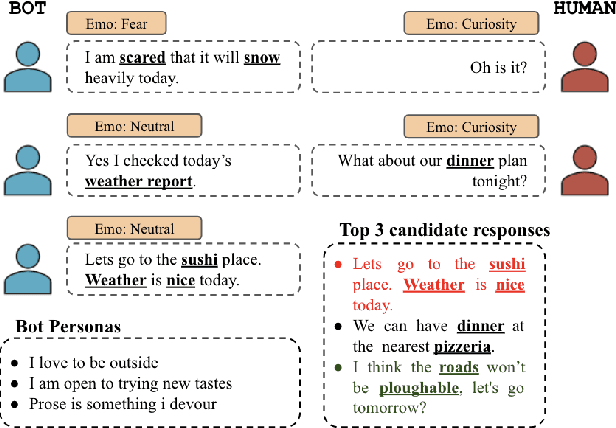

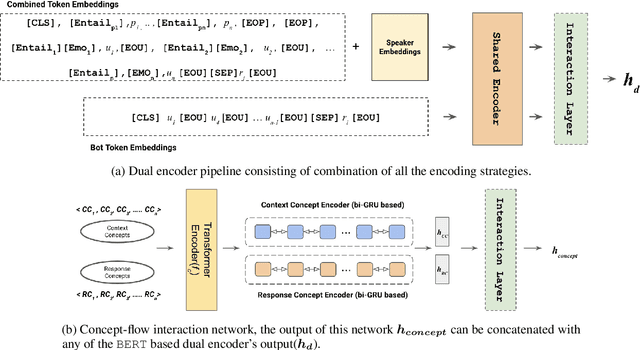
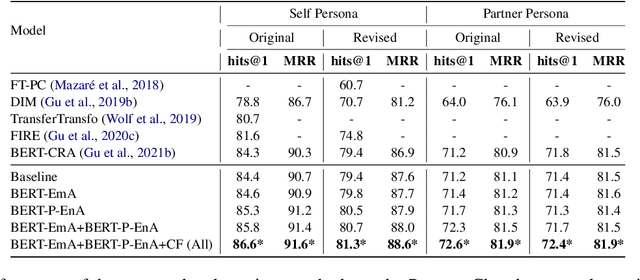
Abstract:Personalized response selection systems are generally grounded on persona. However, there exists a co-relation between persona and empathy, which is not explored well in these systems. Also, faithfulness to the conversation context plunges when a contradictory or an off-topic response is selected. This paper attempts to address these issues by proposing a suite of fusion strategies that capture the interaction between persona, emotion, and entailment information of the utterances. Ablation studies on the Persona-Chat dataset show that incorporating emotion and entailment improves the accuracy of response selection. We combine our fusion strategies and concept-flow encoding to train a BERT-based model which outperforms the previous methods by margins larger than 2.3 % on original personas and 1.9 % on revised personas in terms of hits@1 (top-1 accuracy), achieving a new state-of-the-art performance on the Persona-Chat dataset.
Assessing Effectiveness of Using Internal Signals for Check-Worthy Claim Identification in Unlabeled Data for Automated Fact-Checking
Nov 02, 2021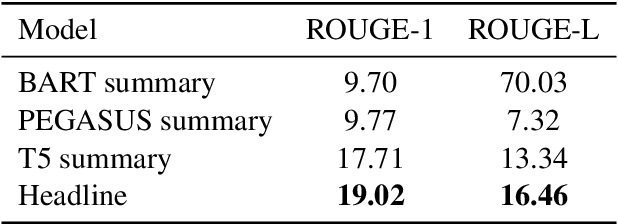
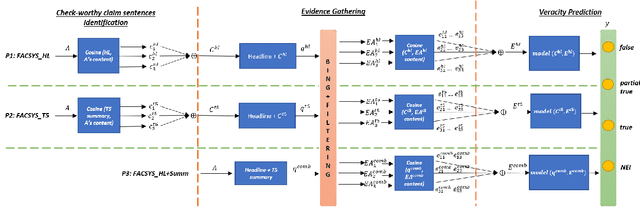
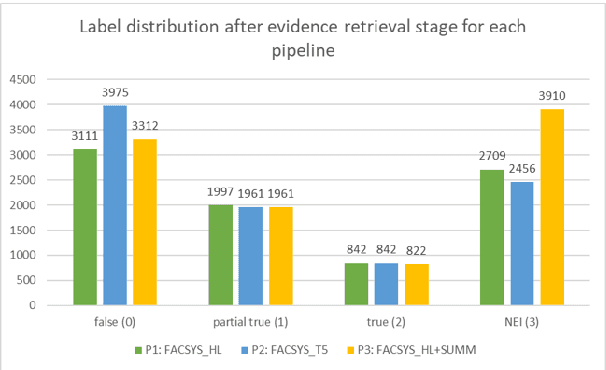
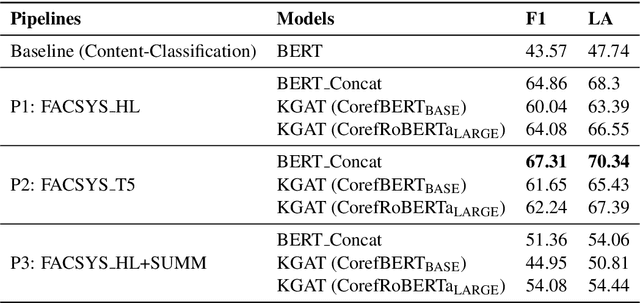
Abstract:While recent work on automated fact-checking has focused mainly on verifying and explaining claims, for which the list of claims is readily available, identifying check-worthy claim sentences from a text remains challenging. Current claim identification models rely on manual annotations for each sentence in the text, which is an expensive task and challenging to conduct on a frequent basis across multiple domains. This paper explores methodology to identify check-worthy claim sentences from fake news articles, irrespective of domain, without explicit sentence-level annotations. We leverage two internal supervisory signals - headline and the abstractive summary - to rank the sentences based on semantic similarity. We hypothesize that this ranking directly correlates to the check-worthiness of the sentences. To assess the effectiveness of this hypothesis, we build pipelines that leverage the ranking of sentences based on either the headline or the abstractive summary. The top-ranked sentences are used for the downstream fact-checking tasks of evidence retrieval and the article's veracity prediction by the pipeline. Our findings suggest that the top 3 ranked sentences contain enough information for evidence-based fact-checking of a fake news article. We also show that while the headline has more gisting similarity with how a fact-checking website writes a claim, the summary-based pipeline is the most promising for an end-to-end fact-checking system.
Proto: A Neural Cocktail for Generating Appealing Conversations
Sep 06, 2021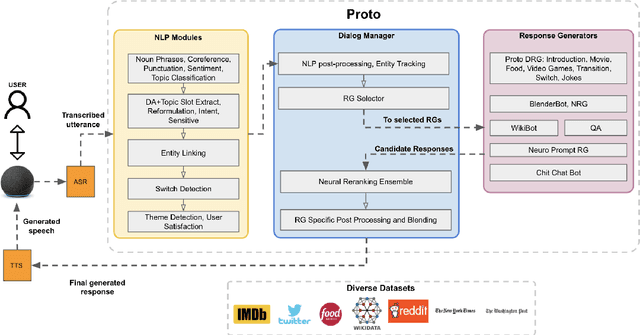
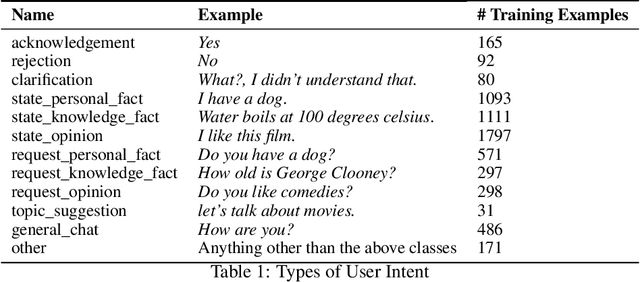
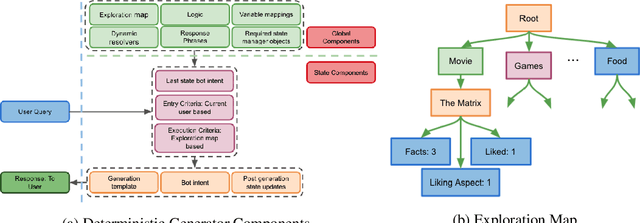

Abstract:In this paper, we present our Alexa Prize Grand Challenge 4 socialbot: Proto. Leveraging diverse sources of world knowledge, and powered by a suite of neural and rule-based natural language understanding modules, state-of-the-art neural generators, novel state-based deterministic generators, an ensemble of neural re-rankers, a robust post-processing algorithm, and an efficient overall conversation strategy, Proto strives to be able to converse coherently about a diverse range of topics of interest to humans, and provide a memorable experience to the user. In this paper we dissect and analyze the different components and conversation strategies implemented by our socialbot, which enables us to generate colloquial, empathetic, engaging, self-rectifying, factually correct, and on-topic response, which has helped us achieve consistent scores throughout the competition.
Medical Literature Mining and Retrieval in a Conversational Setting
Jul 23, 2021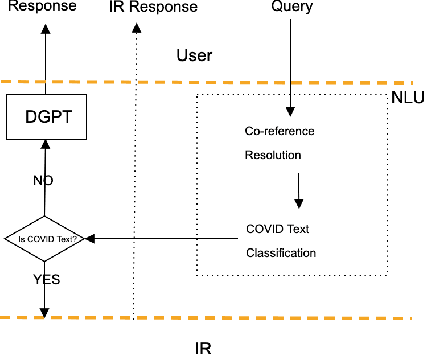
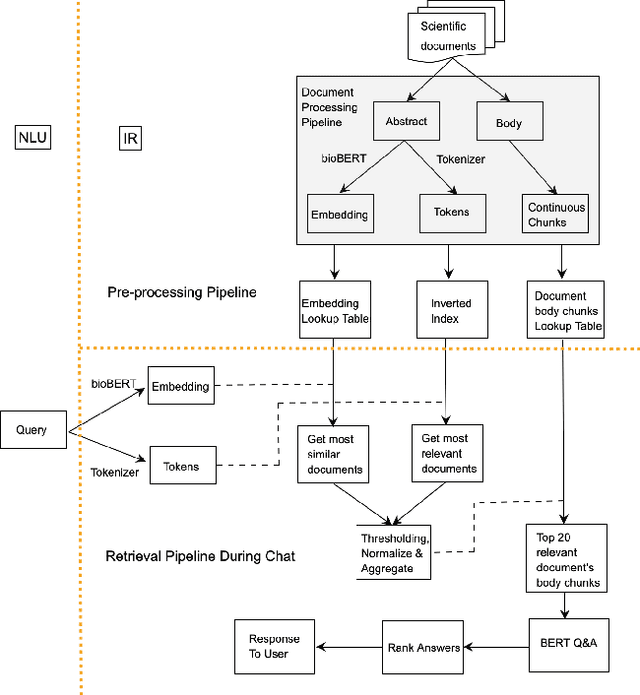

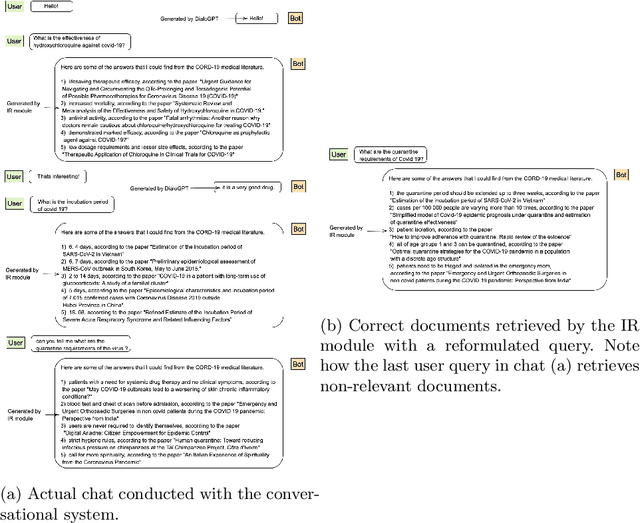
Abstract:The Covid-19 pandemic has caused a spur in the medical research literature. With new research advances in understanding the virus, there is a need for robust text mining tools which can process, extract and present answers from the literature in a concise and consumable way. With a DialoGPT based multi-turn conversation generation module, and BM-25 \& neural embeddings based ensemble information retrieval module, in this paper we present a conversational system, which can retrieve and answer coronavirus-related queries from the rich medical literature, and present it in a conversational setting with the user. We further perform experiments to compare neural embedding-based document retrieval and the traditional BM25 retrieval algorithm and report the results.
 Add to Chrome
Add to Chrome Add to Firefox
Add to Firefox Add to Edge
Add to Edge